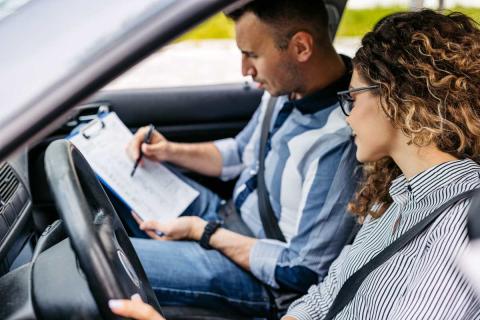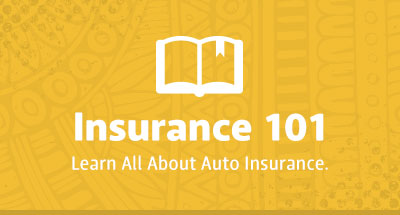Illinois Driver's License Test & Requirements

Getting a license in Illinois, which includes taking the state driver’s license test, can be daunting. A license is required for drivers to get to and from work or school and is a form of state ID.
Remember that once you get your driver’s license, you need car insurance to drive in Illinois. Since the state of Illinois requires all drivers to carry liability insurance, and auto insurance may help cover the costs in the case of a covered accident, consider visiting an auto insurance agency such as Illinois Vehicle Insurance Agency, LLC (Illinois Vehicle).
Read on to learn about the process of getting an Illinois license, tips for taking the driver’s license test, and how having auto insurance can help you in the long run.
Understanding the State of Illinois driver’s license test requirements
You must pass a written exam and a road test to get an Illinois driver’s license. Let’s go over what each of them involves.
1. Illinois written driver’s test
To take the written driving test, you should make a DMV appointment with the Illinois Secretary of State or find an office that welcomes walk-ins.
The written portion of your driving exam will have 35 questions. The questions will cover topics such as road signs, traffic laws, safety rules, and accident prevention. You will need to get 28 out of the 35 questions right to pass the written test.
If you fail this written part of the test, you will need to retake it. You may be able to retake it on the same day, depending on your local Secretary of State office appointment availability.
To study for the written driver’s test, Illinois residents use the pamphlet “Illinois Rules of the Road.” Illinois drivers must take the exam every eight years, unless they have no traffic convictions.
2. Illinois driver’s license road test
First, let’s discuss the requirements for the road test:
- If you’re a new driver or are turning 79 years of age or older and want to renew your license, you must take a driving exam.
- It’s suggested that new drivers aged 21 or older take a driving school course. (Teen drivers aged 15 to 17 need to enroll in a driver education course to receive their permit.)
The following are required of your vehicle for the road test:
- It must be licensed and have the equipment listed on the “Illinois Rules of the Road” pamphlet (mirrors, safety belts, lights, etc.)
- Be in the same weight category as your license application.
- Display an Illinois license plate and a valid registration sticker.
- Be properly insured. You must bring proof of insurance to your road test. All vehicles operating in Illinois must have liability insurance.
- A driver with a valid license or permit must drive you to the facility.
Remember that there are legal and financial consequences of driving without a license in Illinois. Prepare your documents before scheduling a road test.
During your road test, an examiner will review whether you can perform standard driving maneuvers such as starting, parking, turning, etc.
3. Types of licenses available
Depending on your age or driving needs, you can apply for the following:
- Learner’s permit: To apply for one, you must be at least 15 years old and be enrolled in or have graduated from a state-approved driver’s course.
- Real ID-compliant driver’s license: A real ID license allows you to board domestic flights and enter federal facilities such as a military base.
- Standard driver's license: Can be used for driving and general identification purposes, but will not allow you to board domestic flights or enter federal facilities.
- A duplicate or corrected license: Apply for one if your original license got lost or if you need to update your personal information.
- Commercial driver’s license (CDL): If you need a new CDL, you will be required to take Entry-Level Driver Training (ELDT) from a registered training provider.
Notice: As of July 2024, Temporary Visitor’s Driver’s Licenses (TVDLs) are no longer issued. You can now apply for a standard driver’s license instead when you bring the required non-citizen list of documents.
4. Documents required for application
The Illinois state ID requirements vary depending on your residence status and age. As of May, 2025, to get a standard driver's license in Illinois, you will need the following documents:
- Proof of date of birth (such as a birth certificate)
- Proof of Social Security number
- Proof of residency (one document); and
- Proof of signature. During the verification process, your signature will be required to match.
To get a Real ID- ID-compliant driver’s license, you will need the above documents, plus:
- Proof of identity
- A second document to prove Illinois residency
If your name has changed, you must show documentation showing the reason for the name change (such as a marriage certificate). For more information, see the current Illinois Rules of the Road publication.
Step-by-step guide to getting your Illinois driver’s license
Step 1: Prepare your documents
Review the list of documents above or on the Illinois Secretary of State website.
Step 2: Obtain a learner’s permit
If you are 15 to 17 years old, you can receive a learner’s permit. You must show proof that you are enrolled in an approved driver’s ed course. You must have a permit for nine consecutive months before applying for a license if you are 15 to 17.
Additionally, Illinois drivers under 18 need 50 hours of supervised driving experience, including 10 hours of nighttime supervised driving.
Your permit will be valid for up to two years.
Step 3: Apply for a license
To apply for a driver’s license, visit a Secretary of State DMV facility and bring the required documentation.
Fees vary depending on the type of license or ID you apply for, so check the current “Illinois Rules of the Road” publication for fee information.
Special considerations for non-citizens or new Illinois residents
Previously, non-citizens could apply for a Temporary Visitor Driver’s License (TVDL). However, as of July 1, 2024, TVDLs are no longer be issued.
If you were eligible for a TVDL previously, you can apply for a standard driver’s license. With the HB 3882 act, undocumented immigrants can apply for a standardized Illinois Driver's License. This license will serve as a valid ID and is compliant with the REAL ID Act.
This will replace the current Temporary Visitor Driver's License (TVDL) with a standard 4-year license that serves as a valid form of identification and remains compliant with the federal REAL ID Act.
How having a driver’s license impacts your auto insurance
Having a valid license is a requirement to operate a vehicle in Illinois. Without a license, you may face higher premiums or limited policy options.
Factors like age, driving experience, and how long you’ve had a valid driver’s license may affect your insurance rates. For example, younger drivers and newly licensed adults tend to have higher premiums until they have established a safe-driving history.
Illinois Vehicle has affordable auto insurance options for new drivers, teens, and new Illinois residents. We can help you choose a policy from various carriers, even if you carry different types of licenses, including:
- Licenses issued by another state
- Driver’s licenses from other countries or a Matricula
- Temporary or suspended licenses
- State IDs
- SR-22 Certificates
Before you drive
Remember that it’s of crucial importance to drive with a valid license in Illinois. Having one can also give you better options for auto insurance premiums. An Illinois Vehicle agent at any of our locations can discuss your options for affordable auto insurance.
Get a quote online from Illinois Vehicle or call 630-581-4805 for a free quote.
Disclaimer:
This material is for general informational purposes only. The products, services, and discounts referenced herein are not available in all states or from all companies. All statements are subject to the terms, exclusions, and conditions of the applicable policy. In all cases, the actual language of the policy contract prevails. Coverage is subject to individual policyholders meeting the insurer's underwriting qualifications and state availability. Other terms, conditions, and exclusions may apply.






